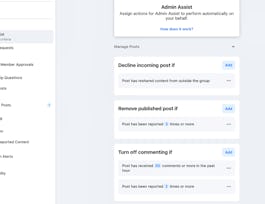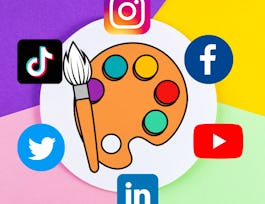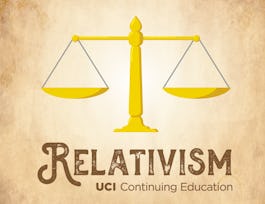Fake news or good science? In a world where we have access to unlimited information, it is hard to sift through the echo chamber of opinions fueled by emotions and personal biases, rather than scientific evidence. Science Literacy will teach you about the process of science, how to think critically, how to differentiate science from pseudoscience, how indigenous wisdom can inform science, how to understand and design a scientific study, and how to critically evaluate scientific communication in the media. Every module will build your new skill-base with real life examples, and at the end of each module you will have to apply these skills to scientific questions, talking points and controversies in the world. Warning: this course requires an open mind and the ability to self-reflect.


Science Literacy
Taught in English
Some content may not be translated
17,806 already enrolled
(240 reviews)
Recommended experience
What you'll learn
Learn how to think critically and understand the scientific method
Learn how to form well balanced and logical scientific arguments, read and design scientific research papers
Learn how to differentiate and discriminate science from pseudoscience, fake science and bad science
Become scientifically literate, and be able to critically evaluate information in the mainstream and social media, as well as every day life
Skills you'll gain
Details to know

Add to your LinkedIn profile
33 quizzes
See how employees at top companies are mastering in-demand skills


Earn a career certificate
Add this credential to your LinkedIn profile, resume, or CV
Share it on social media and in your performance review

There are 5 modules in this course
Welcome to Science Literacy! In a world where we have access to unlimited information, it is hard to sift through the echo chamber of opinions fueled by emotions and personal biases, rather than scientific evidence. Science Literacy will teach you about the process of science, how to think critically, how to differentiate science from pseudoscience, and how to critically evaluate scientific communication in the media. In this first module, we'll hear from indigenous elders about the traditional process of knowledge collection, and how it can be used to inspire, consolidate, and validate scientific hypotheses. We'll introduce the process and purpose of scientific thought and give you some tips and tricks for identifying biases in arguments, as well as how to distinguish common sense and intuition from genuine scientific theories. You'll also meet your presenters Claire and Rachel in the first video, so let's get started, and get scientifically literate!
What's included
7 videos10 readings4 quizzes
In this module, you are going to learn how to differentiate and discriminate science from pseudoscience. We'll look at some common examples of pseudoscience in everyday life, and practice separating them from science, bad science and plain ol' fraudulent science. Finally we'll find out just what it is that makes pseudoscientific language so appealing, how to combat it by staying skeptical and examine the harm that pseudoscience can do, if left unchallenged.
What's included
3 videos7 readings10 quizzes1 discussion prompt
In this module you'll learn a fundamental skill in science literacy- critical thinking! We'll introduce you to the basics of critical thinking before giving you the tools to try and apply some critical thinking to actual case studies. We'll also introduce the concept of correlation and demonstrate the difference between correlation and causation. We'll also examine the importance of replicability and the value (and burden) of extraordinary evidence. Finally, we'll visit the work of Karl Popper and discover why falsifiability lies at the heart of science literacy, and while complex conspiracy theories may appeal to the X Files fans in us, in science, the simplest explanation is often the most likely to be correct. So come on, it's time to get critical!
What's included
6 videos19 readings10 quizzes
In this module, we'll be taking a deep dive, into the particular methods that scientists use to form knowledge and understanding of the world around us. We'll be dissecting the different parts of a scientific paper, learn that there is a way to read even the densest scientific papers and give you an opportunity to test these new skills out. You'll also learn how to construct a scientific experiment, from forming your hypothesis, to choosing your variables and most appropriate method of research design, from natural to survey. After this module, you'll not only be able to rad and understand scientific reports, but you'll be able to design and carry out your own!
What's included
4 videos13 readings1 quiz
Who knows you better than your peers? Well, if you're science...no one! In this module we'll be looking at all aspects of the peer review system, through which scientific knowledge is published- its pros, and its imperfections. We'll look at how statistics can be used to substantiate scientific theories, but also how they can be used to bolster spurious correlations and dodgy data! We'll also look at how the media communicates and miscommunicates science, and how even scientists themselves can fall into the traps of sharpening, leveling and pseudosymmetry. Finally, we'll explore open data and open access as an option for the improvement of science communication and improving access for the general public to scientific research, so they don't have to rely on social media!
What's included
7 videos25 readings8 quizzes
Instructor

Offered by
Recommended if you're interested in Basic Science

Coursera Project Network

Coursera Project Network

University of Virginia

University of California, Irvine
Why people choose Coursera for their career




Learner reviews
Showing 3 of 240
240 reviews
- 5 stars
62.91%
- 4 stars
22.50%
- 3 stars
7.08%
- 2 stars
2.91%
- 1 star
4.58%
New to Basic Science? Start here.

Open new doors with Coursera Plus
Unlimited access to 7,000+ world-class courses, hands-on projects, and job-ready certificate programs - all included in your subscription
Advance your career with an online degree
Earn a degree from world-class universities - 100% online
Join over 3,400 global companies that choose Coursera for Business
Upskill your employees to excel in the digital economy
Frequently asked questions
Access to lectures and assignments depends on your type of enrollment. If you take a course in audit mode, you will be able to see most course materials for free. To access graded assignments and to earn a Certificate, you will need to purchase the Certificate experience, during or after your audit. If you don't see the audit option:
The course may not offer an audit option. You can try a Free Trial instead, or apply for Financial Aid.
The course may offer 'Full Course, No Certificate' instead. This option lets you see all course materials, submit required assessments, and get a final grade. This also means that you will not be able to purchase a Certificate experience.
When you purchase a Certificate you get access to all course materials, including graded assignments. Upon completing the course, your electronic Certificate will be added to your Accomplishments page - from there, you can print your Certificate or add it to your LinkedIn profile. If you only want to read and view the course content, you can audit the course for free.
You will be eligible for a full refund until two weeks after your payment date, or (for courses that have just launched) until two weeks after the first session of the course begins, whichever is later. You cannot receive a refund once you’ve earned a Course Certificate, even if you complete the course within the two-week refund period. See our full refund policy.


